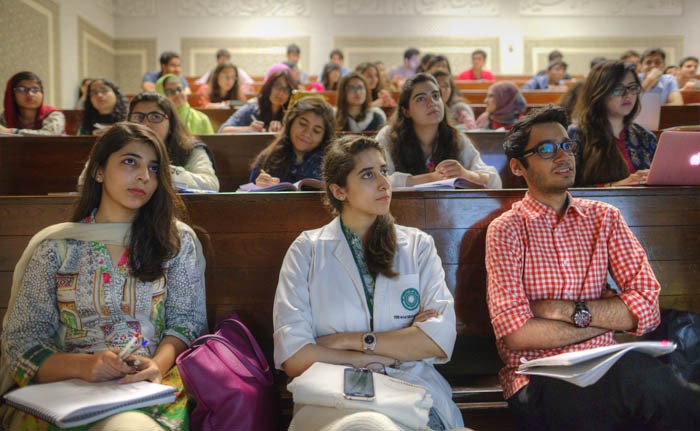
Students and their parents must make informed choices while deciding about undergraduate programmes

While going through the pages of our national newspapers, one finds many advertisements by various universities and institutions offering admissions. Most of the institutions highlight their degree programmes which are open for admission.
It is sometimes confusing for young people and their parents to decide about the universities and programmes to apply for. There are many foreign universities that conduct road shows to attract young talent.
Given the fact that the country has over 175 universities and degree-awarding institutions and a very wide range of subject combinations, selecting a university for admission is a tough task for millions of young students. There are a few common considerations taken into account by the pupils and their parents.
Based on subject combinations, the aspirants can be broadly categorised into five groups. Students with pre-medical qualifications mostly want to join degree programmes in medicine or dentistry. Others apply for degrees in pharmacy, biology and medical engineering. Admission to degrees requiring a lower merit are in micro biology, bio-chemistry, botany and related disciplines.
The second group includes science pre-engineering candidates. They have a broad range of engineering disciplines, architecture and computer science to chose from. Mechanical and electrical engineering, electronics, computer science, telecommunications, urban development, biology, textile, chemical, metallurgical, petro-chemicals, polymer and mining engineering are some of the common subjects.
Those who are not able to pursue professional degrees mostly opt for programmes in physics, chemistry, mathematics and statistics. The third group is of students who have studied commerce at the intermediate level. They apply for business administration and commerce degrees or courses leading to accountancy education/training.
Besides, multiple certification programmes in accountancy are now commonly studied. After registration and studies, the candidates complete the requirements and either become certified accountants with qualifications from relevant bodies in the UK or USA, or continue studies to earn a bachelors degree. The fourth group comprises those qualified in arts subjects. They have a wide variety of social science disciplines: English, Urdu, economics, sociology, mass communications, international relations, political science, film and linguistics, etc. The fifth category includes those who want to explore fine arts, crafts, fashion design, advertising and media studies.
It is generally believed that the programmes which have the highest merit are the best, at least in comparative terms. The term ‘best’ often implies disciplines with the most lucrative job prospects for its graduates.
But this is true only partially. Employment opportunities depend upon performance of different sectors, progress, growth as well as supply and demand equation at a given point in time. The quality of education also generates an extraordinary impact. For instance, degrees in business administration were probably one of the most sought after option before the growth of private universities and degree-awarding institutions. Whereas the demand for such graduates has declined, the alumni from premier institutions easily make their way into the job market.
Similarly, graduates in basic engineering such as mechanical or metallurgical fields find appropriate jobs as they are only produced by few universities. Not many private universities find it feasible to venture into disciplines which require most expensive hardware and resources. Besides, the employability conditions change with time. For instance, architects and civil engineers were in high demand about five years ago. Due to prevailing recession and consequent decline in construction, renovation and other development works, their demand has been negatively affected.
The possibility of changing one’s career after the first degree remains open. Undergraduate qualifications are only the fundamental basis of any branch of learning and application. Higher qualifications, training and on-job experience develop the human resource towards gainful specialisations. In many cases, young professionals adopt a hybrid approach. An engineer or a medical doctor may choose to follow a career in civil services, banking, marketing or enterprise management. It becomes viable on account of aptitude, inclination, opportunities or simply luck.
There are many examples of luminaries who possessed degrees that had very little to do with their chosen field of work. Eminent artist and sculptor, Guljee, was a qualified engineer. Famous writer, Qudratullah Shahab, earned his living through his career in civil service. Humourist, Shafiq-ur-Rehman, was a senior military officer. Men of letters, such as Jamiluddin Aali and Mushtaq Ahmed Yousufi were bankers. The current Chief Minister of Sindh, Murad Ali Shah, is an engineer with postgraduate degrees from abroad as well.
Many graduates in medicine and engineering became famous pop singers. Today, the opportunities to change one’s career path are many. Degree holders in languages often seek a degree in law or business administration after completing a few pre-requisites. Similarly, an accountant may become a copy writer or an anchor by virtue of his talent.
A learning attitude, capability to raise questions, communication and inter-personal skills as well as self-discipline are a few attributes that can transform everyone into a sought after individual for important assignments.
Students and their parents must make informed choices while deciding about undergraduate programmes. Some tips may help. Based on the performance merit in the higher secondary school, place of residence and affordability status, an inventory of relevant public and private sector institutions may be prepared.
Adequate preparation for entrance examinations - where ever applicable - must be done. Students must apply to all institutions within their range in order to keep the choices open. During this process, students must continue to learn about the scope of their desired field and its applications. In case they find the actual contents different from their expectations, a re-consideration must be made. A few general principles must be kept in mind. Reputation of the institutions, past and present faculty and track record of alumni can be defining parameters in this respect.